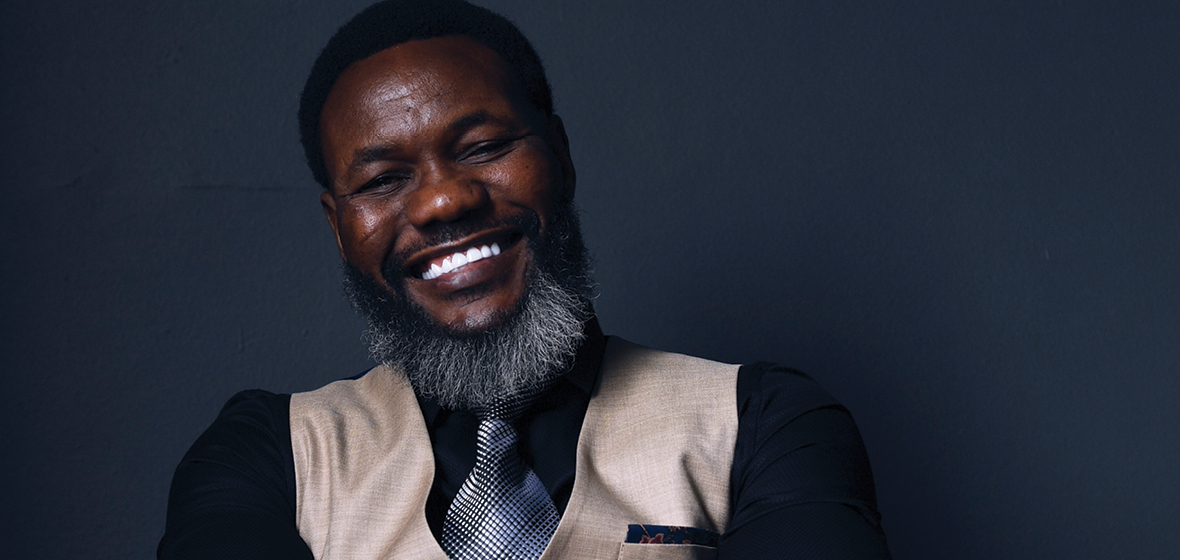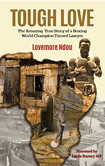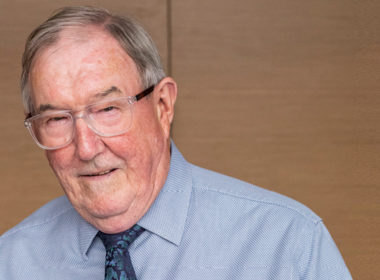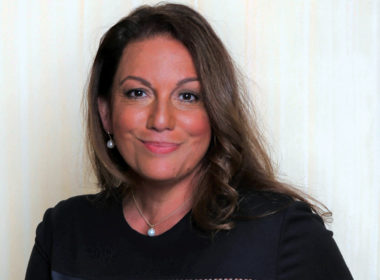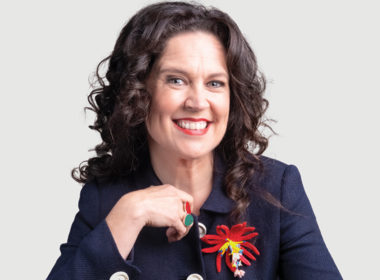Three boxing world titles, six university degrees and his own law firm were never enough for criminal lawyer Lovemore Ndou. The former South African boxer-turned Australian lawyer recently published a book about his incredible life story. He shares snippets over lunch.
Main photo: Nic Walker
I spot him striding towards me from two blocks away. Pinstriped three-piece suit, pocket square, dark glasses, dazzling white grin. A sore thumb on this sweltering December day among the faded flip-flops and singlet tops of suburban south Sydney.
Perhaps it is a hangover from his professional boxing days – in which he claimed three world titles across two weight divisions – but Lovemore Ndou never fails to make an entrance.
The South African boxer-turned-Australian criminal lawyer is known around Sydney’s courts for his striking outfits. Today, that means a tailored, charcoal-striped suit with matching waistcoat, pocket square and a thick Windsor-knotted black tie. Never mind that Australian summer is in full swing at 35-plus degrees.
“Going to court can be like stepping into the boxing ring,” Ndou told me when we first met four years ago, in an interview for the March 2016 issue of LSJ. “You wouldn’t step into a boxing ring with no confidence and no fancy robe – you need to have a bit of swagger in you.”
If the outfits help Ndou exude confidence in the courtroom, I speculate they’re also something of a novelty for the former boxer. Where he grew up, in the poverty of post-apartheid South Africa during the 1980s and 90s, fancy outfits and café lunches like the one we are now sitting down to would have been other-worldly extravagances.
“I come from a family with seven siblings and we all lived in one small hut. There were days that I would go to school all day without a meal,” he tells me. “That’s how poor we were. It was normal – you accepted it in South Africa.”
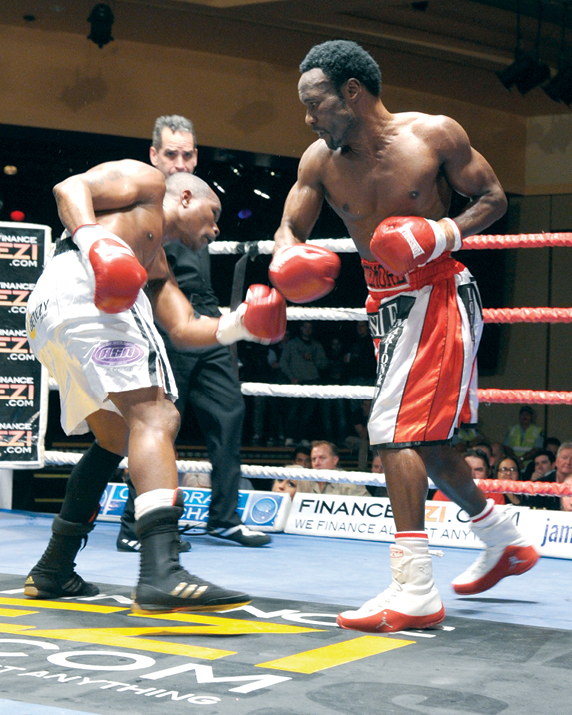
We are dining at Sir Braxton’s café in Rockdale, Ndou’s local favourite for its short walking distance to his criminal defence firm Lovemore Lawyers. The café is known best for its showy and calorific desserts but Ndou never deviates from his athlete-lean order: grilled salmon with steamed mash and vegetables, and sparkling water.
“We didn’t eat for the sake of enjoyment in South Africa,” he adds, while I delight in the ooze of my poached eggs on smashed avocado toast.
Ndou, more than most Australians, is acutely aware of the luxuries he has acquired in his adopted home country. So much so that, every year in January, he carries out a personal ritual by fasting for one month. He doesn’t eat or drink between 4am and 6pm. When he breaks the fast in the evening, he eats a meal no larger than the size of his palm.
“It reminds me of my upbringing and reminds me there are people out there who are doing it tough every day,” he tells me. “I share their pain. Just because I have it good now, I shouldn’t take it for granted. It reminds me to continue working. It keeps me hungry, literally.”
When we met back in 2016, Ndou remained tight-lipped about the specifics of his former life in South Africa. Like a nimble boxer, he ducked questions about the inch-long scars above his right eye.
But since then, Ndou has written and published an autobiography of his life, aptly titled Tough Love. The book recalls in stark detail many of those traumatic experiences that Ndou found too painful to recount in person. One chapter reveals how his forehead scars – which most people assume are boxing wounds – were inflicted by a police dog attack while he was locked up as a 16-year-old, without charge, by corrupt South African police. Another chapter paints a harrowing picture of teenage Ndou’s best friend dying in his arms, shot by police during an anti-apartheid protest.
The cumulative effect of these experiences made Ndou an angry and erratic young man. It was simply good fortune that led him to boxing, where he learned to channel his anger toward opponents in the ring. This led to a 14-year professional career in which he rocketed up world rankings in 64 fights and 49 wins, earning three world titles before his retirement in 2012.
“I look back and I’m so grateful for boxing. If it wasn’t for boxing, I would probably be dead now or locked up in jail,” he says. “We are talking about South Africa, where almost every teenager walked around with a gun. I had lots of guns. It’s quite amazing that I survived, especially considering my temper at the time.”
Boxing also opened doors for Ndou that were previously firmly shut to South African black men. He was able to move to Australia and study journalism at the University of Technology, Sydney. Later, countless encounters with toxic managers and unfair boxing contracts prompted him to study law at the University of Western Sydney.
“The lawyers would come in and say, ‘I’m gonna screw you’, or, ‘I’m gonna take care of you’, depending which side they were on,” says Ndou. “Eventually I became sick of being exploited, I decided I should educate myself [in the law].”
“I love fighting for justice,” he continues. “Not everyone charged with a criminal offence has in fact committed that offence. It inspires me that the rule of law actually applies in Australia. In South Africa, they talk about the rule of law, but it isn’t really a thing. Crime and corruption are everywhere.”
Ndou qualifies this by adding Australia has its own issues to come to terms with, including the high incidence of Indigenous imprisonment and deaths in custody.
I know I would be putting my life at risk, but I’m prepared to die for it. If I die fighting for what I believe in, then I rest in peace.
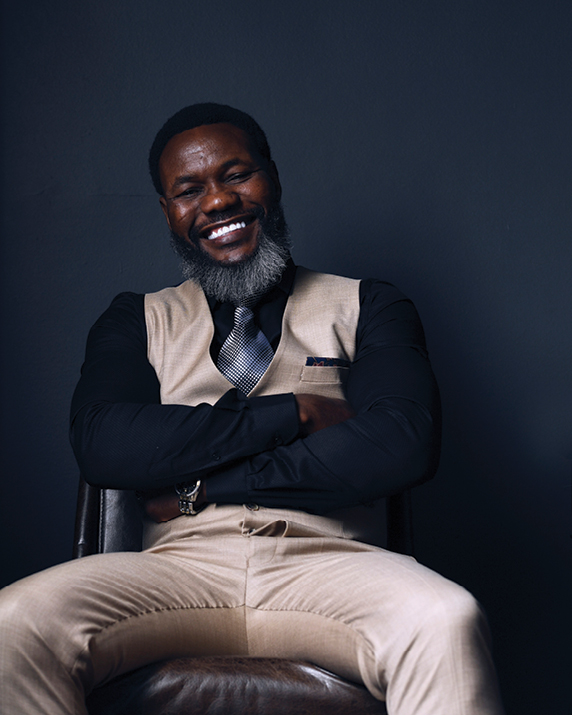
I ask if Ndou, with his lived experience of apartheid, considers Australia a racist country.
“Not as a whole,” he replies. “But you will always have a few people out there who make racist comments or act in a way that amounts to racism.
“Bill Clinton once said, ‘We all have a bit of apartheid in us,’ and I agree with that. It’s when you look at someone and think differently of them, because they are Asian or white or black. When someone says, ‘I won’t work with a woman’ – that’s apartheid. Anyone who thwarts someone from excelling because of their skin colour, gender, sexual preference or anything else, as far as I’m concerned, that’s apartheid. It doesn’t have to be legislated to exist.”
Since being admitted as a solicitor and starting his own firm in 2013, Ndou has added three masters degrees to his lengthy legal resume. Tough Love has lapped multiple rounds of Australian media and will be released in South African bookstores this year. A handful of commercial film producers have already approached Ndou about turning his incredible life story into a film. But he says his ultimate goal is to go back to South Africa as a lawyer and become a politician to rebuild the rule of law and democracy.
“As long as politicians remain corrupt and run the legal system there, nothing is going to change,” he says.
“I know I would be putting my life at risk, but I’m prepared to die for it. If I die fighting for what I believe in, then I rest in peace.”

